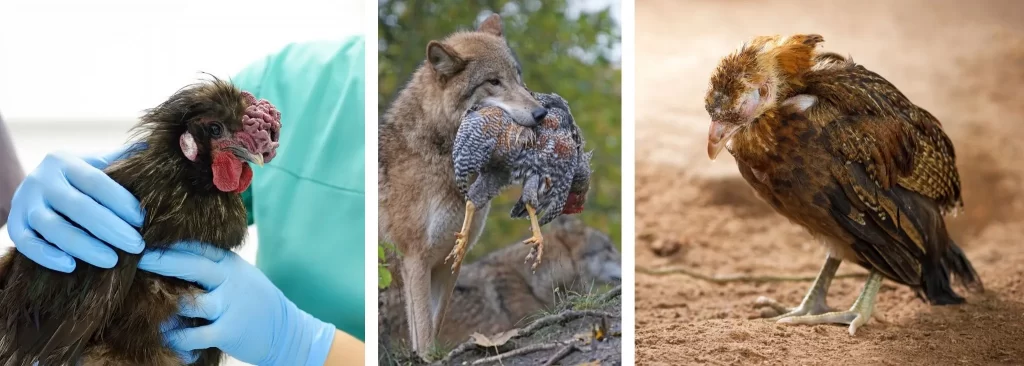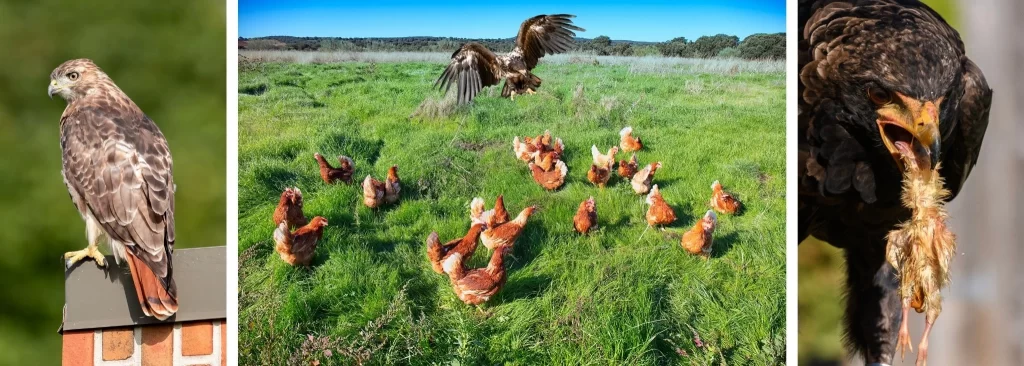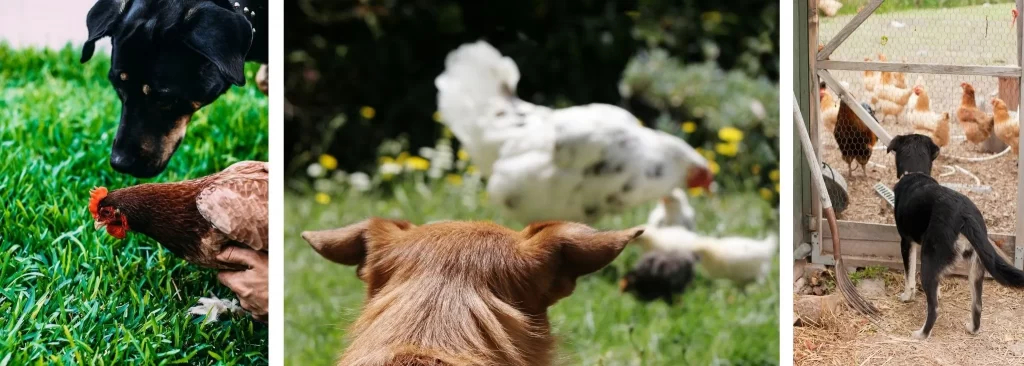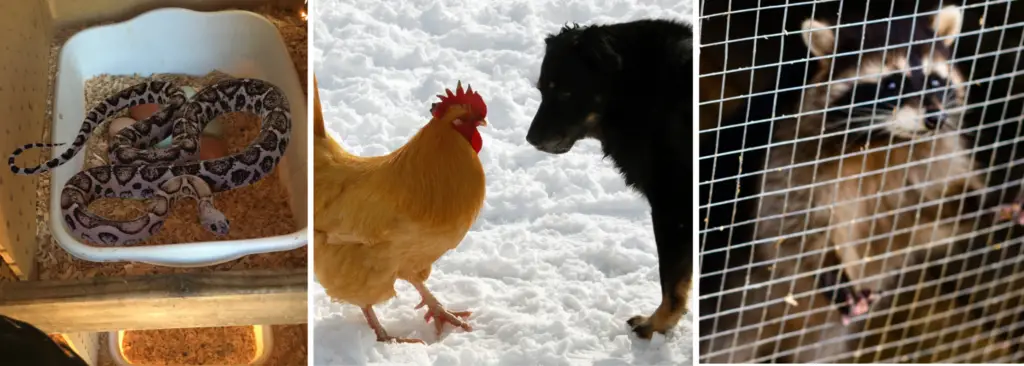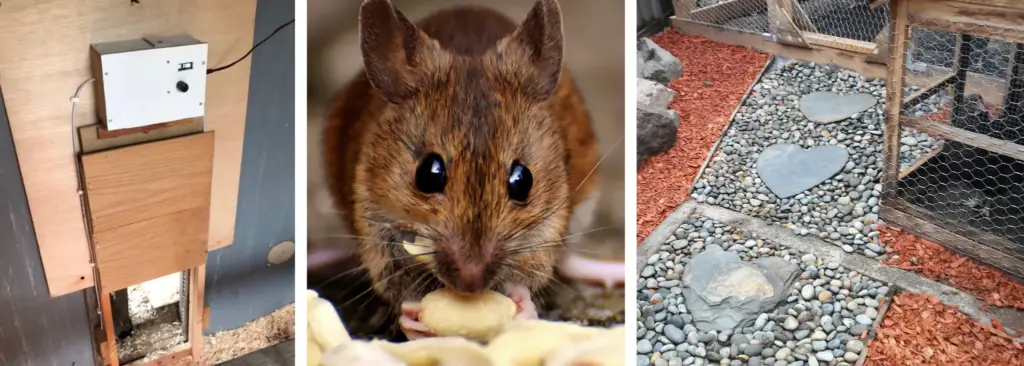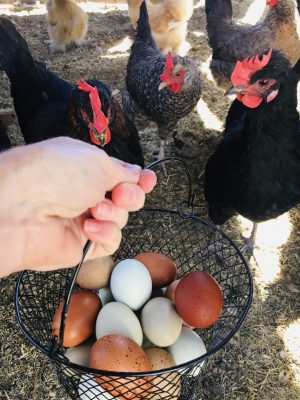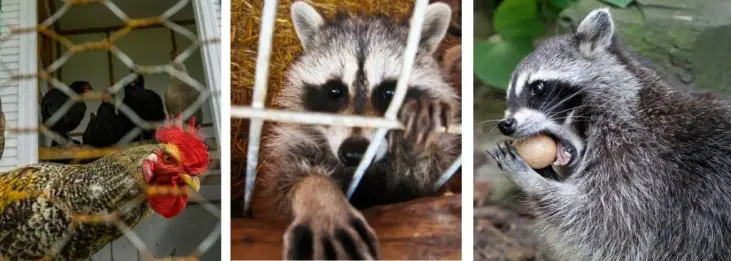
Raccoons may look cute and cuddly, but beware if you own chickens because raccoons will sneak up and attack them, especially at night when they are roosting.
Over the years, raccoons have adapted to many environments and can be found in urban, sub-urban and rural areas. They are nocturnal and do most of their hunting from dusk until just before dawn.
This article will help you to identify if a raccoon attacked your chickens and inform you as to what you can do to protect them from a future attack. This is important, because once a raccoon attacks, it will be back for more!
“How do I Know if a Raccoon Attacked My Chickens?”
- What Does it Look Like if a Raccoon Attacks a Chicken?
- How Does a Raccoon Kill a Chicken?
- What Time of Day do Raccoons Usually Hunt?
- Signs a Raccoon is Around Your Chicken Coop
- What do Raccoons Eat?
- What Can I Do If a Raccoon is Killing My Chickens?
- Can You Shoot a Raccoon if it is Attacking Your Chickens?
- Do Raccoons Eat Chicken Eggs?
- Will a Raccoon Attack a Human?
- Common Backyard Predators
- CONCLUSION: How do I Know if a Raccoon Attacked My Chickens?
What Does it Look Like if a Raccoon Attacks a Chicken?
Signs a Raccoon is Killing Chickens:
- You find several dead chickens, but they are only missing their crops, abdomen(internal organs) and head.
- Raccoons will seldom eat a whole chicken.
- Parts of chicken, blood and feathers everywhere
- Raccoon tracks
- Raccoon skat
- Chicken wire pulled off enclosure
- Simple gates unlatched
- Simple nesting boxes opened and eggs taken
- Simple food containers opened
Do Raccoons Eat Chickens or Just Kill Them? Raccoons do actually eat chickens, just not usually the whole thing. They most commonly will only eat the crop, internal organs (abdomen) and sometimes even the head.
How Does a Raccoon Kill a Chicken?
Raccoons have very sharp teeth and claws. It will use its sharp claws to grab a chicken and it will bite its head or neck to kill it. It will continue to hold the chicken with its claws and use its sharp teeth to rip out the crop and parts of the abdomen.
Why do Raccoons Kill Chickens and Not Eat Them? Raccoons are known to reach their tiny little hands through chicken wire and grab a chicken by the head and only eat this. This is because chicken heads are tiny enough to fit through the chicken wire. You are better off installing 1/4″ hardware cloth to prevent this from happening.
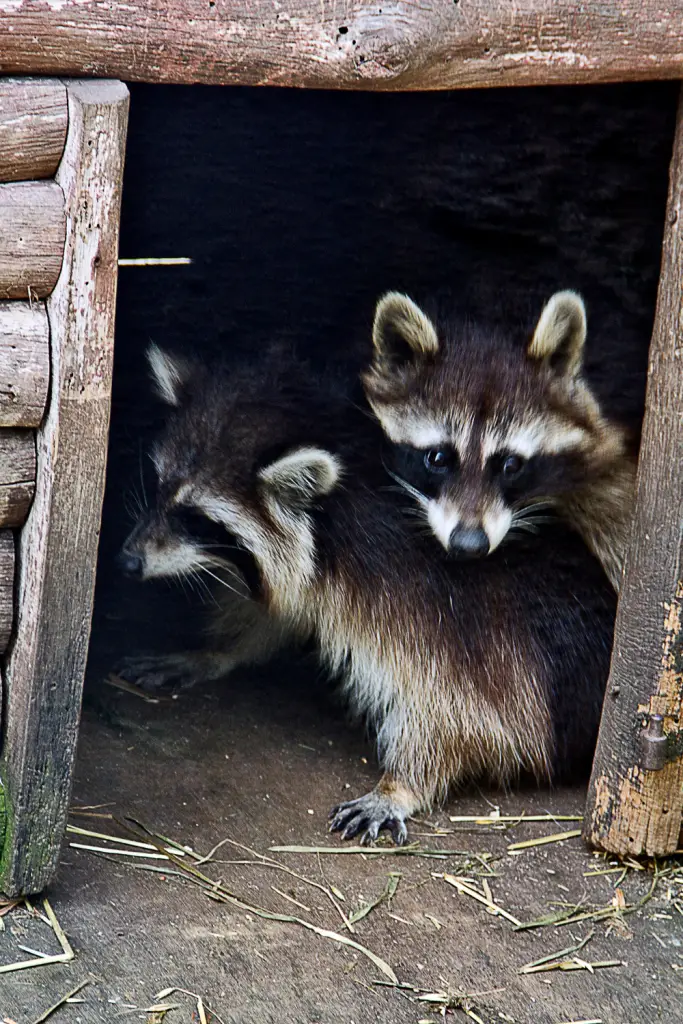
What Do Raccoons Do to Chickens?
- Raccoons will sneak up and attack sleeping chickens.
- They will rip chicken wire off of the enclosure.
- Raccoons can open simple chicken coop doors, gates, nesting boxes and food containers.
- Raccoons will eat a chickens crop and abdomen and leave the rest strewn out around the yard or coop.
- Once a raccoon knows where a good food source is, it will come back for more. This is why it is so important to do something about it as soon as you know that you have a raccoon problem.
What Time of Day do Raccoons Usually Hunt?
Raccoons are nocturnal mammals. They most commonly hunt beginning at dusk and continue until just before the crack of dawn.
“Do raccoons kill chickens during the day?” While it isn’t as common, raccoons do sometimes hunt in the daytime. This is more common in the late summer to early fall when baby raccoons start to venture out on their own.
In the daytime, the hawk is a chickens number one predator. To find out how to determine if a hawk may have attacked your chickens, read my article, “How Do I Know if a Hawk Attacked My Chickens.”
Signs a Raccoon is Around Your Chicken Coop

- Raccoon Footprints
- What do raccoon tracks look like? Raccoons have feet with 5 toes that resemble a human hand. Sometimes you can also see claw marks in their tracks.
- Scat
- What does raccoon scat (poop) look like? According to Critter Control, “Raccoon poop is tubular in shape, have blunted ends, and are usually dark in color, though coloration is subject to change depending on what the animal has recently consumed.“
- Hearing High Pitch Chattering Noises at Night
- What does a raccoon sound like? Raccoons can be heard, usually late at night, chattering and if they are scared or confronted can be heard screaming, snarling or growling.
What do Raccoons Eat?
Raccoons are omnivorous and out in the wild will eat both plants and animals. In the city, food is much easier to come by. They often get their meals from garbage cans, pet food that has been left out, compost piles and backyard chickens.
| RACCOON DIET IN THE WILD | RACOON DIET IN THE CITY |
|---|---|
| BERRIES | FOOD FROM GARBAGE CANS |
| NUTS | BACKYARD CHICKENS |
| SQUIRRELS | LEFT OUT CHICKEN FEED |
| RATS | WATER FROM CHICKEN WATER CONTAINERS |
| FISH | FRUIT THAT DROPPED FROM TREES |
| FROGS | VEGETABLE GARDEN |
| CRAYFISH | DOG FOOD |
| MUSSELS | CAT FOOD |
| TURTLES | COMPOST PILE |
| MICE | BIRD SEED |
| RABBITS | FOUNTAIN WATER |
| INSECTS | WATER FROM PET BOWLS |
| BIRD EGGS | GRUBS FROM LAWN |
What Can I Do If a Raccoon is Killing My Chickens?
- Lock Chickens Up Before Dusk– Because raccoons most commonly come out just after dusk, it is best to make sure your automatic chicken door locks your flock inside the chicken coop before dusk.
- Install Hardware Cloth Fencing– Hardware cloth fencing is the best fencing to help prevent raccoons from getting to your chickens.
- 1/4″ hardware cloth is small enough that a raccoon cannot reach their tiny little hands through and grab a chicken by the head, neck or feet.
- Hardware cloth is also stronger than chicken wire.
- A raccoon is both smart and strong enough to pull chicken wire from a chicken coop to get to your chickens.
- Deter Raccoons with 2 Step Locks– Raccoons have 5 toes that are extremely dexterous. Raccoon toes are like human hands and they are able to manipulate objects (such as simple gate locks, door nobs, latches, etc.) with ease.
- Metal Garbage Cans for Food Storage– Put food away each evening and place it in metal garbage cans with a two step locking lid. Regular food container lids are too easy for raccoons to open.
- Keep Compost Bin Far from Chicken Coop– A raccoon has a very good sense of smell and leftover kitchen scraps in a compost pile will attract many nighttime predators, including raccoons. Keeping it too close to the coop is an open invitation to some more food, including leftover chicken food, water, eggs and your chickens too.
- Keep Perimeter Clean Around the Chicken Coop
- Guard Dog– A barking dog is enough to scare away a raccoon. Many people that own chickens, goats, etc. also invest in livestock guardian dogs to help protect their livestock.
- Clean Up Fruit Under Fruit Trees Daily– Make it a point to pick your fruit from the tree when it is ripe and pick up any fruit that falls to the ground daily. The less accessible you make food to raccoons, the less likely they will be to hang around. They are looking for the easiest way to get food.
- Collect Eggs Before Dusk Each Day– Raccoons love eggs and if they are easy to get to, will help itself to all it can. Do one last scan of your nesting boxes before dusk to make sure you didn’t have any late afternoon layers.
- Don’t Leave Pet Food Outside– Leftover cat or dog food on your doorstep is an open invitation to a raccoon.
- Cayenne Pepper Around Perimeter of Chicken Coop– Raccoons have a strong sense of smell and cannot stand the smell of cayenne pepper. Sprinkle some of this around the perimeter of your chicken coop. It is safe for your chickens, but will help keep the raccoons away.
- How to Scare Raccoons Away
- Owl Decoys– Owls are predators of raccoons. Place owl decoys on fence posts and up on top of your chicken coop. Move them around every few days to keep the raccoons at bay.
- Scarecrows– People scare raccoons, so placing scarecrows around your property will help to deter a raccoon. To keep raccoons at bay, move it around every few days.
- Flashing Lights– Flashing lights look like nighttime predator eyes and will startle raccoons.
- Wind Chimes–
- Talk Radio– Raccoons are deterred by the sound of talking. If you are having a problem with raccoons hanging out around your chicken coop, keep your radio on a talk radio station to help deter them. Make sure your talk radio isn’t within earshot of your neighbors.
- Loud Noises– If you see a raccoon and want to quickly scare them away, shout at them or bang some pots and pans at them. This should get them to scamper away.
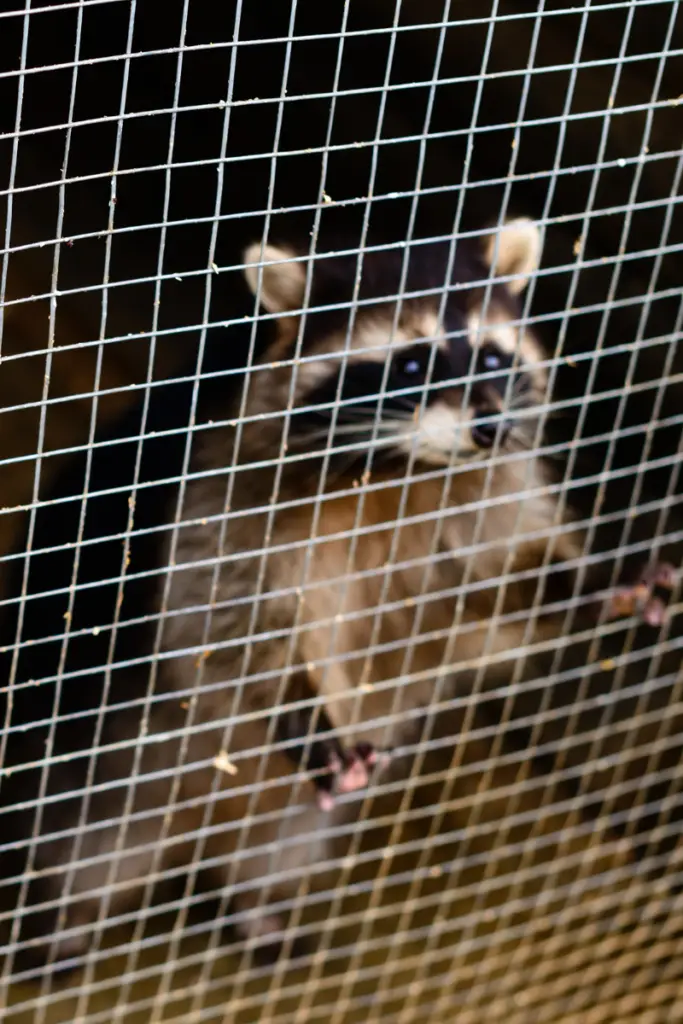
Can You Shoot a Raccoon if it is Attacking Your Chickens?
If you live in the city, you cannot shoot a raccoon, but in most cities you can humanely trap them. Check with your city to find out what your local laws are. If you do not live in the city, most states will allow you to kill a raccoon that is actively killing your chickens. Check to find out what your local laws and ordinances are.
Do Raccoons Eat Chicken Eggs?
Raccoons love chicken eggs. This is why it is so important to do one last nesting box check each evening(before dusk) and collect any eggs from your late laying hens.
Will a Raccoon Attack a Human?
Generally speaking, no, a healthy raccoon will not attack a human. It is always best to leave raccoons alone though.
A spooked raccoon can come at you and scratch or bite you. Raccoons can carry many viruses and insects that can be passed on to both humans and chickens.
| VIRUSES AND INSECTS PASSED FROM RACCOONS TO HUMANS AND CHICKENS |
|---|
| RABIES |
| PSEUDORABIES |
| INFECTIOUS CANINE HEPATITIS |
| RACCOON PARVO- VIRALENTERITIS |
| CANINE DISTEMPER |
| ROUNDWORMS |
| TICKS |
| FLEAS |
Common Backyard Predators
Raccoons are just one of a chickens many backyard predators. Hawks, dogs and opossums are a few other common backyard predators. It is important to know what the most common predators are for the area that you live in and make the appropriate changes to protect your flock.
CONCLUSION: How do I Know if a Raccoon Attacked My Chickens?
Raccoons will attack and eat your chickens, chicken eggs and leftover chicken feed. It is important to do what you can to protect your flock from all predators, including raccoons.
Tell-tale Signs that a Raccoon Attacked Your Chickens:
- missing chickens
- head, crop, abdomen eaten
- raccoon tracks
- raccoon poop
- gates opened
- feed containers opened
- chicken eggs missing
- chicken wire pulled off chicken coop frame
Protecting Your Flock from Raccoons Includes the Following:
- Securing the chicken coop with hardware cloth.
- Use 2 step lock on chicken coop gates and feed.
- Locking your flock in the coop before dusk.
- Putting away any uneaten chicken feed and pet food and water.
- Collecting eggs one last time, before dusk.
If you notice any signs that a raccoon is on your property, i.e. tracks, poop, make whatever changes necessary to protect your flock. This is important because once a raccoon attacks your chickens, it is very likely to return for more.
How do I Know if a Raccoon Attacked My Chickens? – https://www.backyardchickensmama.com/how-do-i-know-if-a-raccoon-attacked-my-chickens/

